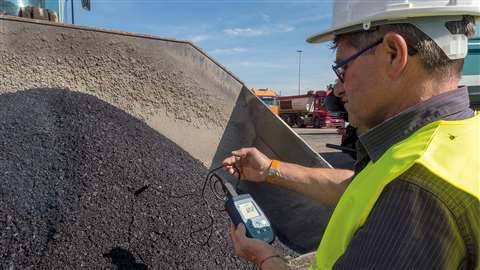Benninghoven asphalt mixing plants to improve sustainability
03 May 2022
Reduced-temperature asphalt is an increasding trend as road construction authorities focus on issues surrounding CO2 balance, protecting resources and reducing the energy input, according to the Wirtgen Group.
 The production of reduced-temperature asphalt, is also known as low-temperature asphalt, warm asphalt or warm mix (Photo: Wirtgen)
The production of reduced-temperature asphalt, is also known as low-temperature asphalt, warm asphalt or warm mix (Photo: Wirtgen)
Reduced-temperature asphalt is a mixture produced at a temperature between 110 °C and 130 °C. Hot asphalt, on the other hand, is typically produced between 140 and 180 °C – usually with bitumen at 160 °C as a binder. The main advantage of reduced-temperature mixtures is that they can be conveniently produced and processed in a conventional manner, says Wirtgen.
Asphalt mixing plants from Benninghoven are in use all over the world. Wirtgen believes that they are proof that high standards with regard to the quality of the mixture and economic efficiency along with climate and health and safety requirements can all be perfectly combined.
According to the German Asphalt Association, a temperature reduction of just 30 °C results in a saving of 0.9 litres of heating oil (or a fuel equivalent) per tonne of finished asphalt. Wirtgen added with a daily production of 2,000 tonnes of mixture, this corresponds to a saving of 1,800 litres of oil or up to three-quarters of the annual heating energy consumption of a home – the reduction in CO₂ emissions is 6,000kg per day.
Many companies are striving to achieve zero emissions in their long term plans and this method demonstrates a high potential for saving energy as well as significantly reducing CO2 emissions.
STAY CONNECTED


Receive the information you need when you need it through our world-leading magazines, newsletters and daily briefings.




